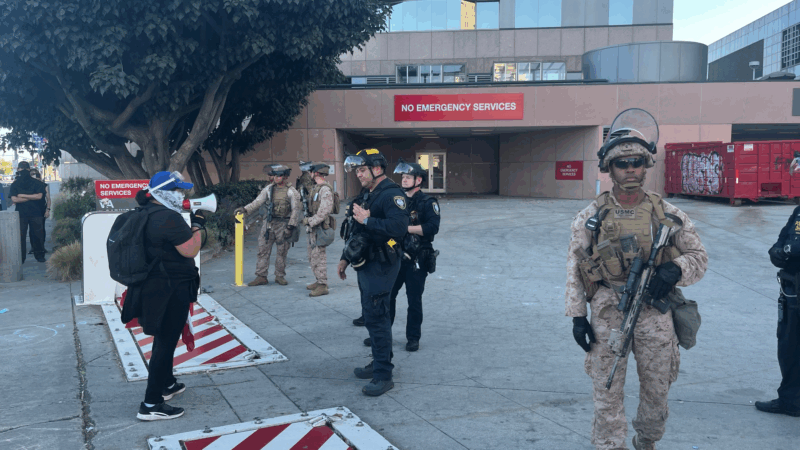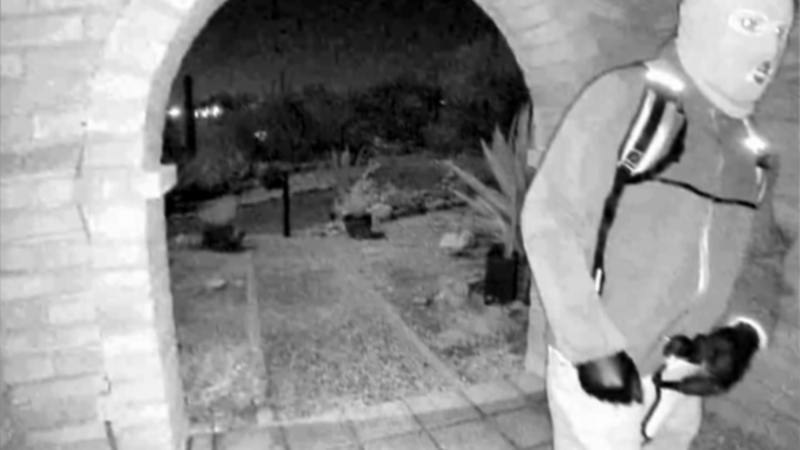As courts review military in L.A., immigration enforcement accelerates
The dispute over President Trump’s decision to federalize thousands of National Guard troops and deploy them to Los Angeles has moved to a San Francisco federal appeals court.
On Tuesday, it heard a request from the Trump Administration to extend the block on a lower court’s ruling that required Trump to return control of the Guard to California Governor Gavin Newsom.
The president sent more than 4,000 Guard members to the city to protect federal property and employees during tumultuous protests against immigration enforcement; Newsom says the deployment of the Guard and an additional 700 Marines was an overreaction and counter-productive.
But while the status of the military units in Los Angeles remains undecided, the immigration raids that touched off the protests in early June have intensified.
“Operations are getting a little bit more faster, and they’re in and out,” says Vlad Carrasco, with the immigrant advocacy group CHIRLA, where he’s part of a “rapid response” effort that rushes to the sites of reported raids by Immigration and Customs Enforcement, or ICE. Carrasco says he used to be able to get there in time to document ICE actions, but that changed in early June. Now when he gets to the scene, ICE is leaving or already gone.
“They know it’ll likely cause a mobilization by the local community if they do stay there a long time,” Carrasco says.
Advocacy groups have been sharing videos of ICE and other immigration enforcement officers being confronted by angry civilians. In some cases, National Guard soldiers will emerge from a van to establish a protective line between agents and members of the public, but observers say the more common defensive tactic is speed.
Combine that with the fact that agents are sometimes in plainclothes, masked, or wear insignia from other federal agencies, and the result is widespread fear, says Guillermo Torres of Clergy and Laity United for Economic Justice
“It makes you think of a totalitarian regime,” Torres says. “It makes you think of a country where people are kidnapped. Not only kidnapped, they disappear.”
The Trump administration lays the blame for the stepped-up raids in L.A. on the city itself, and its policies limiting cooperation between local law enforcement and federal immigration enforcement. Administration officials such as “border czar” Tom Homan have repeatedly said “sanctuary” jurisdictions force federal agents to perform risky arrests in neighborhoods, because they’re not able to take custody of their targets from local jails, when local law enforcement arrests them on non-immigration charges.
“These operations have been much more difficult because of Los Angeles’ and California’s sanctuary policies,” Homeland Security Secretary Kristi Noem said last week.
As to agents wearing masks, the acting director of ICE, Todd Lyons, says it’s a necessary response to what he describes as efforts to post the photos and names of agents online, which he says has led to threats to them and their families.
“Is anyone upset with the fact that ICE officers’ families were labeled ‘terrorists’?” Lyons said, earlier this month.
But Oscar Zarate, also with CHIRLA, says the federal government’s deployment of personnel from multiple federal agencies to immigration enforcement in the city has created what he calls a “peak level of anxiety.” Immigration enforcement in L.A. has involved personnel from Homeland Security Investigations, Customs and Border Protection and the Drug Enforcement Administration.
“I think because we’ve seen some of the agents in plain clothing with unmarked vehicles, it’s hard to decipher who they are and what they’re there for,” he says, adding that CHIRLA’s rapid response team is also receiving more mistaken reports from people who see local law enforcement activity and think it’s ICE.
“But I think that’s because [ICE is] kind of in disguise now, and people now can never really decipher who it is,” Zarate says.
ICE agents may soon be forced to identify themselves more clearly, because of a class action lawsuit filed by the ACLU of Southern California in 2020. It challenges immigration enforcement officers who allegedly pretend they’re regular police to lure people out of their homes.
A federal court has granted preliminary approval to a settlement which would, in part, require certain ICE personnel in the Los Angeles region to wear more prominent insignia.
“Requiring that the identifiers at least be equally visibly prominent [as the word “POLICE”] will help with some of the confusion that there is when ICE officers are out and about,” says Stephanie Padilla, a staff attorney with the ACLU of Southern California.
But even if the court settlement is implemented later this year, its effect will be limited: It applies only to ICE, not the employees of the other federal law enforcement agencies that have been drafted into President Trump’s plan for mass deportation.
Top 5 takeaways from the House immigration oversight hearing
The hearing underscored how deeply divided Republicans and Democrats remain on top-level changes to immigration enforcement in the wake of the shootings of two U.S. citizens.
Snowboarder Chloe Kim is chasing an Olympic gold three-peat with a torn labrum
At 25, Chloe Kim could become the first halfpipe snowboarder to win three consecutive Olympic golds.
Pakistan-Afghanistan border closures paralyze trade along a key route
Trucks have been stuck at the closed border since October. Both countries are facing economic losses with no end in sight. The Taliban also banned all Pakistani pharmaceutical imports to Afghanistan.
Malinowski concedes to Mejia in Democratic House special primary in New Jersey
With the race still too close to call, former congressman Tom Malinowski conceded to challenger Analilia Mejia in a Democratic primary to replace the seat vacated by New Jersey Gov. Mikie Sherrill.
A daughter reexamines her own family story in ‘The Mixed Marriage Project’
Dorothy Roberts' parents, a white anthropologist and a Black woman from Jamaica, spent years interviewing interracial couples in Chicago. Her memoir draws from their records.
FBI release photos and video of potential suspect in Guthrie disappearance
An armed, masked subject was caught on Nancy Guthrie's front doorbell camera one the morning she disappeared.






